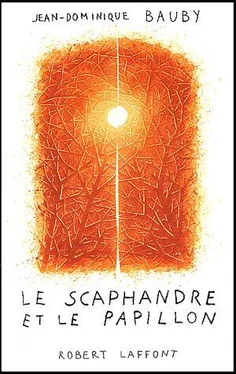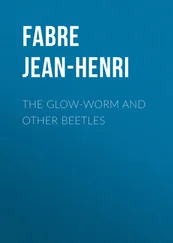Here we come to the end of the road—that disastrous Friday, December 8, 1995. Ever since beginning this book, I have intended to describe my last moments as a perfectly functioning earthling. But I have put it off so long that now, on the brink of this bungee jump into my past, I feel suddenly dizzy. How can I begin to recall those long futile hours, as elusive as drops of mercury from a broken thermometer? How can I describe waking for the last time, heedless, perhaps a little grumpy, beside the lithe, warm body of a tall, dark-haired woman? Everything that day was gray, muted, resigned: the sky, the people, the city, collective nerves on edge after several days of a transport strike. Like millions of Parisians, our eyes empty and our complexions dull, Florence and I embarked like zombies on a new day of punishment amid the indescribable chaos caused by the strike. I mechanically carried out all those simple acts that today seem miraculous to me: shaving, dressing, downing a hot chocolate. Weeks earlier, I had chosen this day to test the latest model of a German automobile: the importer had put a car and driver at my disposal for the whole day. At the appointed hour, a most businesslike young man was waiting outside, leaning against a gunmetal-gray BMW. Through the apartment window I eyed the big sedan, solid and sleek. I wondered how my old Levi's jacket would look in so sophisticated a vehicle. I pressed my forehead against the windowpane to gauge the temperature outside. Florence softly stroked the nape of my neck. Our farewells were brief, our lips scarcely brushing together. I am already running down stairs that smell of floor polish. It will be the last of the smells of my past.
I read the news today, oh boy…
Between crisis-fraught traffic reports, the radio plays a Beatles song, “A Day in the Life.” Crossing the Bois de Boulogne, the BMW glides like a flying carpet, a private world of luxury and comfort. My driver is pleasant. I tell him of my plans for the afternoon: to pick up my son from his mother's place, twenty-five miles outside Paris, and bring him back to the city in early evening.
He didn't notice that the lights had changed…
Théophile and I have not had a heart-to-heart talk, a man-to-man exchange, since I moved out of the family home in July. I plan to take him to the theater to see the new Philippe Arias play, then to eat oysters at a restaurant on Place Clichy. It's all set: we are spending the weekend together. I only hope the strike will not frustrate our plans.
I'd love to turn you on…
I love the arrangement of this number, in which the whole orchestra reaches a crescendo and holds it until the explosion of the final note. Like a piano crashing down seven floors. We reach Levallois. The BMW stops outside my office, and I arrange to meet the driver at 3:00 p.m.
There is only one message on my desk, but what a message! I have to put in an immediate return call to Simone V., former minister for health, once the most popular woman in France, tenured for life at the top spot on the magazine's imaginary honor roll. Since this kind of call is rare, I first ask around to find what we might have said or done to provoke this quasi-divine personality. “I think she's unhappy with her photo in our last issue,” my assistant tactfully suggests. I skim through the issue and reach the offending photo, a montage that ridicules rather than glorifies our idol. It is one of the mysteries of our trade. You work for weeks on a subject, it goes back and forth among the most skillful pairs of hands, and no one spots the glaring blunder that a neophyte would spot in a second. I am pitched into an authentic long-distance tornado. She is convinced that the magazine has been plotting against her for years, so I have the greatest difficulty persuading her that, on the contrary, she is a cult figure at Elle . Normally such damage control is the job of production chief Anne-Marie, who handles all celebrities with kid gloves, whereas as a diplomat I am more akin to Tintin's friend Captain Haddock than to Henry Kissinger. When we hang up after a forty-five-minute exchange, I feel exactly like a trampled doormat.
Although the editorial staff likes to dismiss our chief's luncheons as “rather a bore,” they wouldn't miss them for anything in the world. Our boss, known variously to his supporters as Geronimo, Louis XI, and the Ayatollah, regularly hosts luncheons in order to “take stock,” as he puts it. It is here on the top floor of the magazine, in the biggest executive dining room, that our generalissimo offers his subjects clues about where they stand in his affections. His remarks range from praise couched in velvet tones to the most lacerating of rebukes, and he possesses a whole repertoire of gestures, scowls, and beard scratchings, which over the years we have learned to decipher. Of that final meal I remember very little, except that the condemned man's last drink was water. I think the main course was beef. Perhaps we all caught mad cow disease, which nobody at that time talked about. Since it incubates for fifteen years, we still have time left. The only illness reported that day was President Mitterrand's. The whole of Paris had been hanging on his medical reports, wondering whether he would last the weekend. As it turned out, he had another whole month to live. The worst thing about these lunches is that they go on forever. To save time, I sneaked out afterward through my office, without saying goodbye to anyone. When I met my driver, evening was already falling on the glass facades. It was well past four.
“We're going to be caught in this mess, sir.”
“I'm truly sorry—”
“It's you I'm thinking about, sir.”
For a second I feel like chucking the whole thing: canceling the theater, postponing my weekend with Théophile, retreating to my bed with a plate of cheese and the crossword puzzle. I decide to fight this sense of utter exhaustion that has come over me.
“We'll just have to avoid the freeway.”
“Whatever you think…”
Despite its power, the BMW bogs down in the traffic milling on the Pont de Suresnes. We drive past the Saint-Cloud racecourse and then the Raymond-Poincaré Hospital at Garches. I cannot pass this spot without recalling a quite sinister childhood episode. When I was at the Lycée Condorcet, a gym teacher used to take us to the Marche Stadium at Vaucresson for outdoor sports of the kind I detested. One day our bus ran smack into a man who had dashed out of the hospital without looking where he was going. There was a strange noise, the sound of brakes, and the man died instantly, leaving a bloody streak along the bus windows. It was a winter afternoon, like today. By the time the police finished asking questions, it was evening. A different driver took us back to Paris. At the rear of the bus they were singing “Penny Lane” in shaky voices. Still the Beatles. What songs will Théophile remember when he is forty-four?
After an hour and a half of driving, we reach our goal, the house where I spent ten years of my life. Fog hangs over the garden, which once rang with so many yells and so much helpless, happy laughter. Théophile is waiting for us at the gate, sitting on his backpack, ready for the weekend. I would have liked to phone Florence, my new girlfriend, but it is Friday and she is at her parents' place for the Sabbath. I expect to speak to her after the play. Only once have I participated in that Jewish ritual—here at Montainville, in the house of the old Tunisian doctor who brought my children into the world.
From this point onward, everything becomes blurred. Nevertheless, I get behind the wheel of the BMW, focusing on the orange-tinted dash-board lights. I am functioning in slow motion, and in the beam of the headlights I barely recognize turns I have negotiated several thousand times. I feel sweat beading my forehead, and when I overtake a car I see it double. At the first intersection, I pull over. I stagger from the BMW, almost unable to stand upright, and collapse on the rear seat. I have one idea in my head: to get back to the village and to the home of my sister-in-law Diane, a nurse. Half conscious, I ask Théophile to run and get her as soon as we reach her house. A few seconds later, Diane is there. Her decision is swift. “We have to get to the clinic. As quickly as we can.” It is ten miles away. This time, the driver tears off grand-prix style. I feel extremely strange, as if I had swallowed an LSD tablet, and I reflect that I am too old for such fantasies. Not for a second does it occur to me that I may be dying. On the road to Mantes, the BMW purrs along at top speed and we overtake a long line of cars, honking insistently to force our way through. I try to say something like “Slow down. I'll get better. It's not worth risking an accident.” But no sound comes from my mouth, and my head, no longer under my control, wobbles on my neck. The Beatles and their song of this morning come back into my memory. And though the news was rather sad… I saw the photograph . In no time we are at the clinic. People are running frantically about. I am transferred, limp and sprawling, into a wheelchair. The BMW's doors click softly shut. Someone once told me that you can tell a good car by the quality of that click. I am dazzled by the neon lighting in the corridor. In the elevator, strangers heap encouragement upon me, and the Beatles launch into the finale of “A Day in the Life.” The piano crashing down from the seventh floor. Before it hits the ground, I have time for one last thought: We'll have to cancel the play. We would have been late in any case. We'll go tomorrow night. Where could Théophile have got to? And then I sink into a coma.
Читать дальше












